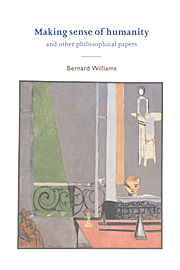Book contents
- Frontmatter
- Contents
- Preface
- I Action, freedom, responsibility
- 1 How free does the will need to be?
- 2 Voluntary acts and responsible agents
- 3 Internal reasons and the obscurity of blame
- 4 Moral incapacity
- 5 Acts and omissions, doing and not doing
- 6 Nietzsche's minimalist moral psychology
- II Philosophy, evolution, and the human sciences
- III Ethics
- Index
1 - How free does the will need to be?
Published online by Cambridge University Press: 28 January 2010
- Frontmatter
- Contents
- Preface
- I Action, freedom, responsibility
- 1 How free does the will need to be?
- 2 Voluntary acts and responsible agents
- 3 Internal reasons and the obscurity of blame
- 4 Moral incapacity
- 5 Acts and omissions, doing and not doing
- 6 Nietzsche's minimalist moral psychology
- II Philosophy, evolution, and the human sciences
- III Ethics
- Index
Summary
The irrelevance of constraint
Locke said that the question was not whether the will be free, but whether we have a will. A fortiori, it cannot be a question of how free the will may be. Locke's remark reminds us that the freedom of the will that has been the subject of the classical problem, if it comes at all, does not come in degrees. People's freedom, however, in more everyday senses, obviously enough does come in degrees.
This point raises a question not only about the classical problem of freewill, but also about the classical compatibilist answer to it, based on the idea that freedom is opposed to constraint and not to necessity. That position certainly deploys an idea of freedom, but of a freedom that may be more or less extensive, and that fact in itself should make us ask whether the position does not miss the point of the problem it is supposed to resolve. It is far from clear what exactly constraint is, but in the kinds of cases usually invoked, somebody brings it about, by intentional application of threats or force, that an agent either cannot attain his original goal at all, or can attain it only at an increased cost. The agent may be confronted by a highwayman who (whatever the standard formula says) does not, in fact, offer him a choice between his money and his life, but rather a choice between losing merely his money, and losing his money together with his life; in that case, he cannot attain the goal of keeping his money at all.
- Type
- Chapter
- Information
- Making Sense of HumanityAnd Other Philosophical Papers 1982–1993, pp. 3 - 21Publisher: Cambridge University PressPrint publication year: 1995
- 12
- Cited by



